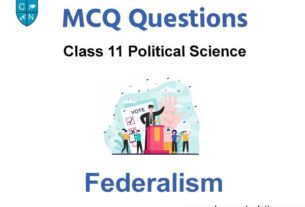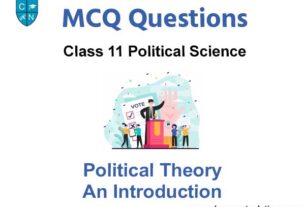Check the below NCERT MCQ Class 11 Political Science Chapter 7 Nationalism with Answers available with PDF free download. MCQ Questions for Class 11 Political Science with Answers were prepared based on the latest syllabus and examination pattern issued by CBSE, NCERT and KVS. Our teachers have provided below Nationalism Class 11 Political Science MCQs Questions with answers which will help students to revise and get more marks in exams
Nationalism Class 11 Political Science MCQs Questions with Answers
Refer below for MCQ Class 11 Political Science Chapter 7 Nationalism with solutions. Solve questions and compare with the answers provided below
Question. Who is the main supporter of the principle of One Nation, One State?
(a) European Union
(b) G.W.F Hegel
(c) J.S Mill
(d) Rousseau
Answer
C
Question. In which state, kurds are found as nationality.
(a) Iran
(b) Iraq
(c) Israel
(d) Jordan
Answer
B
Question. The word ‘Nation’ is derived from which language?
(a) Greek
(b) French
(c) Latin
(d) Russian
Answer
C
Question. A hindrance in the development of nationalism is
(a) Strong historical legacy
(b) Communalism
(c) Emotional integration
(d) Common civilisation
Answer
B
Question. Which of the following is not a difference between State and Nation?
(a) State has four essentials elements but no essential elements of a Nation
(b) Idea of oneness is essential for the Nation but not for the State
(c) Sovereignty is essential for the State and not for the Nation
(d) Sovereignty is essential for the Nation and not for the State
Answer
D
Question. Identify an option which is not the symbol of Indian nationalism
(a) National Anthem
(b) Republic day parade
(c) National flag
(d) Communal violence
Answer
D
Question. A hindrance in the development of nationalism is
(a) Strong historical legacy.
(b) Communalism.
(c) Emotional integration.
(d) Common civilisation.
Answer
D
Question. The word ‘Nation’ is derived from which language?
(a) Greek
(b) French
(c) Latin
(d) Russian
Answer
C
Question. Which among the following are the factors that constitute a nation?
a) Territory
b) Political identity
c) Common political principles
d) All of the above
Answer
D
Question. Which of the following elements is responsible for the promotion of Nationalism?
(a) Common Motherland
(b) Common Language
(c) Common Race
(d) All of these above
Answer
d
Question. The history of a nation helps to develop
(a) Sense of continuing historical identity
(b) Racial superiority
(c) Regionalism
(d) Political differences
Answer
a
Question. The ”Gujral Doctrine” was adopted in
(a) 1985
(b) 1989
(c) 1992
(d) 1996
Answer
D
Question. The German nation was first unified by
(a) European Union.
(b) Austria.
(c) Prussia.
(d) Russia.
Answer
C
Question. East Timor gained independence from
(a) British.
(b) Russia.
(c) Portugual.
(d) China.
Answer
C
Question. In the nineteenth century, Germany and Italy denoted the examples of
(a) break up of empires.
(b) unification.
(c) lack of nationalism.
(d) dictatorship.
Answer
B
Question. Who is associated with the theory of self-determination?
(a) Abrahim Lincoln
(b) Winston Churchill
(c) W. Wilson
(d) Stalin
Answer
C
Question. Which of the following is not essential feature of Nation?
(a) Common history
(b) Common beliefs
(c) Common culture
(d) Common administration
Answer
D

We hope you liked MCQ Class 11 Political Science Chapter 7 Nationalism with answers provided above. In case you have any questions please post them in the comments section below and our Political Science teachers will provide a response.

